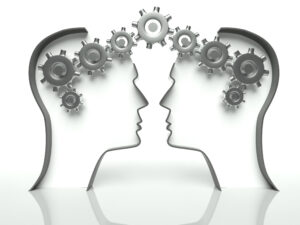
Most forms of couples therapy are focused on resolving conflicts in the present-day lives of couples who seek treatment. Some methods do delve into the historical antecedents of those conflicts, but their primary goal remains helping couples meet their current needs.
Neurodynamic Couples Therapy is based on the belief that the intractable, chronically unresolved conflicts that couples bring to therapy are merely the beginning point of the neurobiopsychological mechanisms of couples systems, which are designed to provide permanent metabolizing and integration of childhood wounds and traumas. As the term neurobiopsychological implies, these mechanisms are biologically programmed into our brains as a natural healing process. All parts of our bodies contain the natural ability to heal, including our brains.
We believe that the system created by the brains of two intimate partners is perfectly constructed to bring historical wounds and traumas into present awareness through current conflicts. The “scripts” of couples’ conflicts contain precisely the right words to expose childhood experiences, providing the vehicle for the voicing of trauma-generated emotions in a uniquely specific way that can only be produced through their neurobiopsychological mechanisms for healing.
The competent therapist who is utilizing these mechanisms must be attuned to material that triggers their own right-brain generated focus and attention. For example, a husband complains, “I’m always having to wait for you!” Something about the way he says “having to wait” creates a feeling within the therapist that something important has been said. The therapist might ask, “Have you had to wait for other people a lot? Does it seem that they care about your waiting? Have you waited and waited and gotten nothing?”, etc.
The therapist then connects this conversation about waiting with a story related earlier in the treatment about the client’s past. In this particular story from my practice, one of the painful patterns in the husband’s past was that, as the third youngest of nine children in his family of origin, he had frequently had to patiently wait for something he needed, only to eventually be pushed aside and ignored. He and his wife had nonconsciously constructed together experiences in which he could access the feelings associated with having to wait.
An important component of this mechanism is its mutual benefit. The wife had been accused in her family of origin of “always making people wait” for her, leading to their characterization of her as self-centered and uncaring. This couple’s mutual conflict script provided the mechanism for simultaneous conscious awareness of the unmetabolized wounds of both partners. I have referred to this neurobiopsychological mechanism as the perfect storm in intimate relationships.
Viscerally experiencing their childhood pain together and voicing their mutual understanding and empathy are the neurobiopsychological mechanisms that “unclog” the partners’ brains and free their energy for permanent growth and development. The therapeutic experience of these mechanisms helps couples become curious about their conflicts as the entrees to healing, eventually eliminating their present-day distress.
